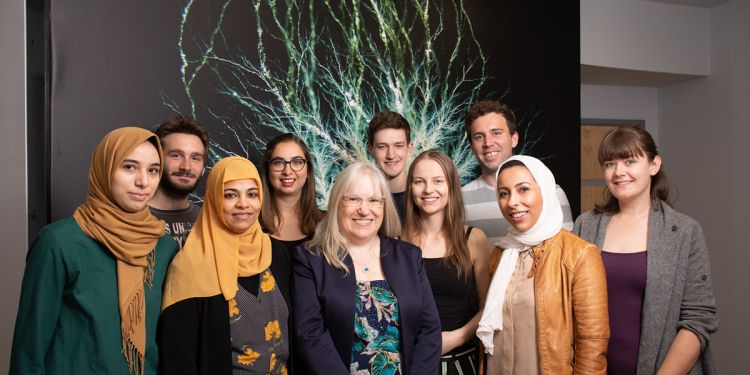
Dr Sandra M Bell
- Position: Lecturer
- Areas of expertise: Breast cancer; Ovarian Cancer; Drug resistance; High throughput siRNA screening; Synthetic lethality
- Email: S.M.Bell@leeds.ac.uk
- Phone: +44(0)113 343 8421
- Location: 8.15a Wellcome Trust Brenner Building
- Website: Breast Cancer Research Group | International PhD Academy | Googlescholar | Researchgate
Profile
I obtained my degree in biochemistry from Sussex University and my PhD on colon cancer genetics from Leeds University.
Having developed an interest in cancer I then went onto work on positional cloning projects in breast and bladder cancer.
I joined the genetics section of the Molecular Medicine Unit in 1996 and worked on a range of projects including the identification of two neurodevelopmental genes MCPH1 and CSMD1.
I joined the newly formed section of Ophthalmology and Neuroscience in 2005 establishing my own group investigating the function of the two neurodevelopmental genes MCPH1 and CSMD1 in cancer.
Responsibilities
- Group Leader
- Member of School Ethics Committee
Research interests
Our group works on a range of projects including functional studies on two neurodevelopmental genes MCPH1 and CSMD1 in breast and ovarian cancer.
Primary microcephaly (MCPH) (OMIM 251200) is a recessive genetic disorder in which the affected individuals are born with a significantly smaller head size and are mentally retarded. We work on MCPH1 (also called BRIT1), which encodes Microcephalin which contains three BRCA1 carboxyl-terminal (BRCT) motifs.
We and co-workers have shown that MCPH1 is involved in DNA repair and regulation of cell cycle checkpoints, particularly the control of entry into mitosis causing premature chromosone condensation.

Figure 1 Mutations in the MCPH1 gene cause microcephaly (A), premature chromosome condensation (B & C) and cancer.
MCPH is thought be a consequence of a mitotic defect during foetal brain development. Abnormalities at mitosis can cause incorrect chromosome organisation and the development of aneuploidy in cancer.
Numerous studies have shown that deletions at the MCPH1 (8p22-p23) loci is associated with tumour development and poor prognosis. We therefore propose that, while germ line defects in MCPH1 cause microcephaly, somatic defects may cause cancer (Figure 1).
We have identified reduced Microcephalin expression in both breast and ovarian cancers which is associated with reduced patient survival. We are studying the biological function of Microcephalin to determine how disruption of its activity causes cancer particularly breast and ovarian.
Currently we are utilizing high throughput screening techniques using small molecule and whole human genome siRNA libraries to elucidate the function of MCPH1 and identify synthetic lethal genes.
I was a founding member of the BioScreening Technology Group (BSTG) established to perform high-throughput, high-content siRNA screens.

Figure 2 Immunohistochemistry staining of paraffin embedded breast cancer samples. Positive nuclear MCPH1 staining (A), loss of MCPH1 expression (B) and comparison of overall survival based on MCPH1 expression in ductal breast cancer patients (C).
CSMD1 (CUB sushi multiple domain protein 1) is a large gene spanning over 2-Mb of chromosome 8p23 (adjacent to MCPH1), which is deleted in many cancer types. A significant amount of evidence points to CSMD1 playing a role in tumour development.
We have previously shown that CSMD1 is an independent prognostic factor in breast cancer and we are currently investigating the function of CSMD1 using in vitro and in vivo models.
Current group members
- Reah Rumbold-Hall Research Technician
- Ahlam Altowairqi PhD student
- Esra Ermis PhD student
- Mashael Aladwani PhD student
- Aqueelah Mohammad PhD student (Co-supervisor)
- Mohammed Derar PhD student (Co-supervisor)
- Basma Alenezy PhD student (Co-supervisor)
- Shengjie Bi MSc student
- Samruddhi Mujumdar MSc student
- Lukkana Promwattanaphan MSc student
Previous group members
MSc/MRes students
- Emma Wood MSc student awarded (Distinction) 2022
- Rebecca King MSc student awarded (Merit) 2022
- Rovar Bakki MSc student awarded (Distinction) 2021
- Albert Blandy MSc student awarded (Distinction) 2020
- Alia Bano MRes student awarded (Merit) 2020 (Co-supervisor)
- Rachel Hodgson, MSc awarded (Merit) 2019
- Hannah Gibbs, MSc awarded (Distinction) 2018
- Alexander Hornsey, MSc awarded (Merit) 2017
- Enoir Faraj, MSc awarded (Distinction) 2015
- Sudeh Riah, MSc awarded 2006.
PhD students
- Samuel Burgess PhD student awarded 2021
- Joanne Topping, PhD student awarded 2021 (Co-supervisor)
- Ekram Shoaib PhD student awarded 2020 (Co-supervisor)
- Abrar Ashi PhD student awarded 2020
- Maram AlJuhni, PhD student awarded 2019 (Co-supervisor)
- Danah Al-Qallaf, PhD awarded 2019 (Co-supervisor)
- Camilla Coulson-Gilmer, PhD awarded 2017
- Thomas Ryan, PhD awarded 2016 (Co-supervisor)
- Aeshah Awaji, PhD awarded 2016
- Kastarzyna Szymanska, awarded 2015 (Co-supervisor)
- Julie Richardson, PhD awarded 2014
- Rawiah Alsiary, PhD awarded 2013
- Mohamed Kamal, PhD awarded 2010
- Raj Achuthan, PhD awarded 2004 (Co-supervisor)
Staff
- Shivani Shukla, Research Technician (2014-2015)
- Thomas Maisey, Research Technician (2012-2013)
- Dr. Victoria Cookson, Post-doctoral researcher (2011-2014)
Qualifications
- 1987, BSc (Hons.) Biochemistry, University of Sussex
- 1992, PhD Colon Cancer Genetic, University of Leeds
- 2021, Fellow of the Higher Education Academy
Professional memberships
- British Association for Cancer Research
- British Society of Cell Biology
- European Association for Cancer Research
Student education
I teach on modules for MBChB students and and am a module leader in the Molecular Medicine MSc programme.
I am also a Personal tutor for 1st & 2nd year MBChB students and Postgraduate Research Tutor for MD/PHD students in Leeds Institute of Medical Research.
I am programme lead for the International PhD Academy: Medical Research based at St James’s University Hospital.

Research groups and institutes
- Leeds Institute of Medical Research at St James's
- Breast Cancer Research Group
- LIMR - International PhD academy
Projects
-
<li><a href="//phd.leeds.ac.uk/project/1502-limr-cancer-biology:-the-role-of-wnt-signalling-in-glioblastoma-therapeutic-resistance">LIMR Cancer Biology: The role of Wnt signalling in glioblastoma therapeutic resistance</a></li>
<li><a href="//phd.leeds.ac.uk/project/1486-limr-cancer:-characterization-of-egfr-signaling-activated-by-the-endothelium-in-the-process-of-breast-cancer-metastasis-to-the-brain">LIMR Cancer: Characterization of EGFR signaling activated by the endothelium in the process of breast cancer metastasis to the brain</a></li>

